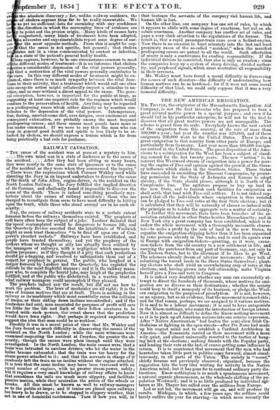RAILWAY . CAUSATION: "TICE cause of the accident was at present
a mystery to him. ... • His oNtn mind ii'as in a state of darkness as to the cause of the accident... .. After they had been sitting so many hours, they were nearly in the same state of ignorance as to the cause of iheiaccident as they Were when they commenced the inquiry." —TheSe'ivere' the expressions which Coroner Wakley used while dicing the Jury in an inquest undertaken In discover the cause of ilicideath of John Allen, engine-dri,iel., in the accident on the North Loudon Railway. The Jury fulfilled the implied direction of- its Coroner; and obediently .found it iinpossible to discover the cause of the death. There is indeed something peculiarly niys- teriotis about the cause of railway accidents : those who are charged to investigate theta seem to have tuost difficulty in hitting upair the trittli; while those who stand around ate in no such ob- sciifity. Nay, the causes of railway accidents were to a certain extent fo' seeribefora the railways themselves existed. The' prophets of he ef,ten been the subject of a joke. 'Lardner declared that eed- contemplated would be dangeronSito. human life; and elerly Review asserted that the inhabitants of Woolwich miglit'itiastion trait themselVes "to be fried 'off upon one of Con- grayiesiricochetirockets:7' Railway* have been established, and pei have • trusted themselves; and yet the prophecy Of the era 'Whom we thiSught so silly has "aotwilly been re-allied by
theli is of railways, with a negligadci which amounts to millositrepense; as if they thotig,ht it a pity that such predictions shatild'gb a-begging,izind resolve d to substantiate them out of a reiiipet for propl*Cy in general. The public who laughed at a
dabgeldforeseen Lardnei kid the Qiecn'telb. has expiated the ridicule the' MOst` frialitfirl manner; and ft the Tailway maws; gere:Whii, to completethe 'Mind joke, may laugh at the prophecies fultlaed,iand at the public Who all:abelieved, in a wanton trust on what reiltiriO• 'managers conliteccompliSh if they pleased. The''penphits indeed saWithe result, but did not see how to work the problem;' The laws of mechanics are all right ;' it is the laws of human motives that are at fault. There is nothing in the railway or itsinMehkiigi?WiiielilMnst essentially cause the collision ofitinimiloi. their sliding 'down inclines 'uncontrolled; ankt it the forebuclers had said men,assoeisted for purposes of profit will care toolittle for thellife anti lithb 'of -their fellow creatures to be trusted with' inch -power's, thel !event shows that the prediction wouldihave:beta right.' o But perhaps it! required experience to suggest the idea that -men mould. he So reckless.
Etossibly it was in a moral' point of 'v'iew that Mr. Wakley and the.Jitry. found snieneh'diffictiltrin !discovering the 'ertaseir of the
accident; on the North London.; mt4.4 witnesses 'were examined. respecting the accident at CrtrYdonithe greater the ob- scurity, though the causes Were 'enough .nntil they were inveritigated. Iwthe North Lontionirtheitnain causei were, 'that a trainlivas intrusted to eareless!dr4ers, who let the water in the boiler 'become exhausted ;: that the ,ffiscia was 'too heavy for the steam-power attached to it ;. and that the servants in charge of it carelessly left the train, on an incline' without the engine attached. It is true that the same iiiclin -may have been 'traversed with an equal number of engines, with no- greater steam-power, safely; but it requires a: very: small knowledge of railway affairs to know that sometimes the raiI4, are much more slippery, and facilitate Passive motion whilethey neutralize the action of the wheels or breaks. All motion, Must; be known as well to railway-managers as -to the public at large and if trains' are plaoed upon railways too heavy to be drawn, or to be stopped in slippery weather, that act is one of homicidal 'Turn it he*, you Will, in thatr. inattince the servants of the company risk human life, and human life-is-lost.
On the other lineif' one -company 'hat one set-of rules, by which it appears to abide with sotat:degree -of exactness, but not an ab- solute exactnese. Another company has another set of rules, and pay a a very sleek attention to the regulations Of the former. The result is, -that a rapid passenger-train-runs over a ballast-engine. Now there is no occasion to hunt minutely into The last Wad least proximate cause of the so-called "accident," when-the manifest predisposing causes are patent to all the world. Such affectation, of nicety is only a contrivance for evading responsibility. : If the individual drivers be convicted, that also is only an evasion; since the companies keep up a system of sharp driving, divided author.: ity, and perplexed signals, which must neutralize all responsibility in their servants.
Mr. Wakley must have found a moral difficulty in discovering the causes of such disasters—the difficulty of understanding how human motives can be so hardened; for if it were not some moral difficulty of that kind, we could only suppose that it was a very immoral difficulty.


























 Previous page
Previous page